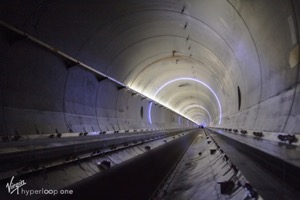July 18, 2018
Last week, the Dallas-Fort Worth Regional Transportation Council of the North Central Texas Council of Governments announced that it will explore hyperloop technology for two major transportation initiatives across the state.
This announcement follows a recent visit to Virgin Hyperloop One’s full-scale test track in the Nevada Desert, where the delegation examined the next-generation technology firsthand. They also met with engineers at the company’s Innovation Campus in Los Angeles.
Hyperloop is a new mode of transportation that allows vehicles to travel at high speeds with minimal aerodynamic resistance by operating in a low pressure environment utilizing next-generation magnetic levitation technology. Last year, Virgin Hyperloop One set a historic test speed record of nearly 240 miles per hour on only 300 meters of acceleration during testing at DevLoop, the world’s first full-system hyperloop test site located in North Las Vegas, Nevada.
Virgin Hyperloop One vehicles are propelled using a linear electric motor, which is a straightened-out version of a conventional rotary motor, according to the company’s website.
Watch members of NCTCOG's Dallas-Fort Worth Regional Transportation Council talk about the hyperloop technoloogy. Courtesy of NCTCOG.
“The RTC is all about bringing innovation to the transportation system in the Dallas-Fort Worth region and hyperloop would be an exciting technology to add,” said Gary Fickes, Tarrant County Commissioner and Chair of the Regional Transportation Council. “I think the future’s very bright for hyperloop and its use in the Dallas-Fort Worth region.”
Rob Lloyd, CEO of Virgin Hyperloop One said the technology would transform what are now separate metropolitan areas into one economic megaregion connected by high speed transport.
“The Dallas-Fort Worth Regional Transportation Council has proven itself as forward-thinking agency that wants to give its region a competitive edge by leveraging next-generation technology,” said Rob Lloyd, CEO of Virgin Hyperloop One.
D-A-FW ENVIRONMENTAL IMPACT STATEMENT
 Later this year, the RTC will issue a Request for Proposals for a consultant team to complete the Tier 2 Environmental Impact Statement for a high-speed corridor connecting Dallas, Arlington and Fort Worth. The RTC wants to consider both hyperloop technology and traditional high-speed rail in the environmental study of the route. A preliminary analysis by Virgin Hyperloop One engineers estimated a six minute hyperloop trip between Dallas and Fort Worth.
Later this year, the RTC will issue a Request for Proposals for a consultant team to complete the Tier 2 Environmental Impact Statement for a high-speed corridor connecting Dallas, Arlington and Fort Worth. The RTC wants to consider both hyperloop technology and traditional high-speed rail in the environmental study of the route. A preliminary analysis by Virgin Hyperloop One engineers estimated a six minute hyperloop trip between Dallas and Fort Worth.
Interior track of the hyperloop.
“As our region grows from 7.2 million people now up to 11.2 million by 2045, we are planning a transportation system that offers choices to our residents. Adding an option like hyperloop to the existing system of roadways, rail transit, bicycle/pedestrian facilities and high-speed rail to Houston would expand the system in an exciting way,” said Michael Morris, P.E., director of transportation for the North Central Texas Council of Governments. “Connecting other regions in Texas through hyperloop would open up economic opportunities throughout the state.”
WEST/CENTRAL TEXAS LOOP
In addition, the RTC has provided funding and has obtained additional funding commitments to undertake a conceptual feasibility study of high-speed technology including hyperloop to connect Fort Worth, Waco, Temple-Killeen, Austin, San Antonio and Laredo.
Watch technicians perform a test run of the hyperloop. Courtesy of Virgin Hyperloop One.
Stay up to date on everything green in North Texas, including the latest news and events! Sign up for the weekly Green Source DFW Newsletter! Follow us on Facebook and Twitter.










